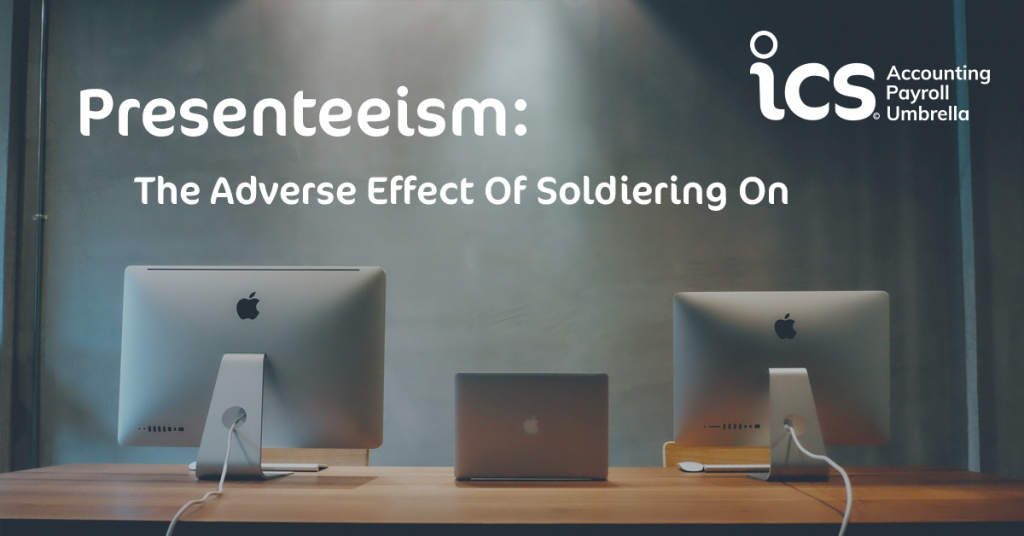Presenteeism, whilst not a new concept, has become a buzz word in 2019 as more and more employers are waking up to the reality that workers putting their work before their health isn’t beneficial for anyone.
It’s the prime time of year for our physical health to take a knock, leading up to Christmas as the weather gets colder and we’re commuting to and from work in the dark. It’s not uncommon for coworkers to be arriving sniffling and coughing, complaining about the weather and soldiering on but is it really such a good thing to be ignoring the warning signs of an illness?
CIPD research found that in 2018, 90% of UK workers had witnessed presenteeism in their workplace. The reasons why people feel the pressure to attend work even when they’re unwell are varied, however, a lot of it comes down to management styles (43%) and the workloads placed upon employees (62%). Slowly but surely the status quo is shifting and businesses are increasingly measuring employee success on the results they achieve, rather than the hours they spend in front of a screen, but progress is slow and the detrimental effect on company productivity is happening now.
We all know that one friend who seems to get all their work done in three hours a day and has time to take lunch, hit the gym and spend time with their family, but how? Well, realistic expectations, effective time management and an acute awareness of personal wellbeing. If you try to do three days worth of work in an afternoon then you’re going to become stressed and overwhelmed, often leading to poor quality work, unhealthy lifestyle choices and an increased risk of illness. We aren’t only talking about physical ill-health either as there is a clear correlation between poor mental health and physical sickness. The CIPD identified that, in 2019, stress-related illness was on the rise in almost two-thirds of UK workplaces. It often fell to line managers to be responsible for identifying mental and physical health issues and signposting their staff to the appropriate resources but “only 37% provide training/guidance for line managers to spot the warning signs of presenteeism”. By not having support systems in place to manage stress-related illnesses it’s estimated that UK businesses are losing £8 billion every year.
But what’s so bad about having dedicated workers who will battle through an illness to get their work done?
Well firstly, from a purely business view, it’s affecting productivity. When a person is unwell at work they aren’t going to be working at 100%, if this continues for days/weeks/months then cumulatively the drop in productivity far outweighs that member of staff taking a day or two to recover. Secondly is staff morale. When co-workers are turning up to work unwell then it sets a precedent, and other workers feel obliged to soldier on. One of the main difficulties in tackling presenteeism is simply identifying it. Absenteeism, by comparison, is simple; you can easily see when a staff member is off and they are asked to explain why. If a staff member is ill at work they often try to hide it and are unlikely to be asked why they decided to come in that day.
Mental health is only just really being talked about honestly and empathetically in the workplace thanks to the work of organisations such as the Mental Health Foundation, CALM, Mind and innovative start-ups such as Sanctus shedding a light on the proliferation of mental ill-health in workplaces across the UK. There is still a stigma around admitting we might be struggling but research shows that 14.7% of us do each year and almost 13% of sick days are due to poor mental health. To effectively combat the issues arising from presenteeism there needs to be adequate support in place in the workplace and frank conversations around when it is ok to take a recovery day. Whether through an Employee Assistance Program (helplines, online doctors, mental health training) or through implementing flexible working such as remote working or flexi-time, all of these steps can help workers who feel pressured to attend work when their mental or physical health has taken a hit. In fact, in a recent survey by Undercover Recruiter, 58% of professionals revealed that they would be more likely to accept a job, or stay in a job, that offered a wellness package as a perk.
The bottom line is we need to talk more and be more honest with our colleagues, clients and managers. It can only be a good thing to train managers to spot the signs of presenteeism but it is also the contractor’s responsibility to monitor their wellbeing and flag occasions when it is impacted, without fear of retribution.
We’d love to hear your views on presenteeism or the best ways you have seen employers tackling workplace stress. If you’d like to share your views, please email tom.dunning-lewis@icsuk.com and we’ll include you in a future blog post!
Further reading:
Taking Care of Yourself (Mental Health at Work) – Mind
When You Should Take a Mental Health Day – VeryWellMind
Why do ill people still come into work? – BBC Worklife



















